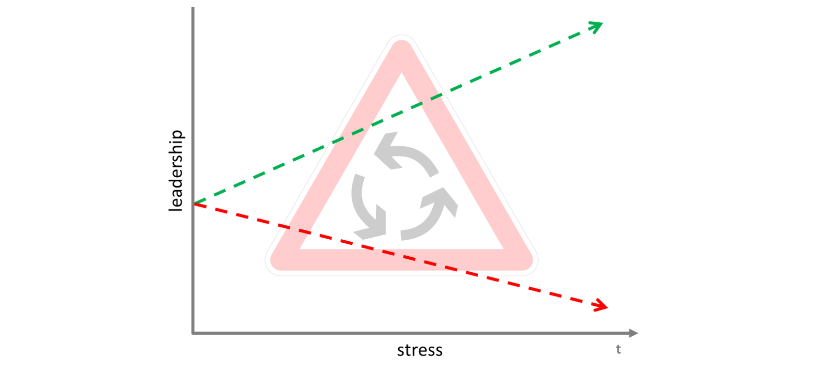Especially at rush hour, I see this time and again, people forcing themselves to give way by driving towards the roundabout at a provocative speed. This behaviour increases the risk of an accident and puts other people in danger. The other road users naturally react indignantly to this wayward behaviour!
In leadership, it can be amazingly similar.
But what is the cause of such behaviour?
I believe there are two main categories:
- Egocentric behaviour (conscious and unconscious).
- Stress-induced reacting
I don’t want to go into the former here. Stress-induced behaviour, on the other hand, seems to me to be an extremely important topic.
A study by Seco[1] has shown that, among other things, excessive demands or intensity of work and long working hours are the main causes of stress. 39% of the employed felt exhausted due to work in 2018 and 24% of the employed experienced “difficulties switching off after work”. Civey’s[2] survey of 5,000 participants in Germany identified the following workplace exhaustion criteria: Pressure to perform 56%, Time pressure 43%, Too much work 41%, Problems with supervisor 31%, Fear of losing work 22%, Poor pay 21%, Problems with colleagues 20% and Strong competition 12%. In everyday working life, prolonged stress caused by external factors can lead to mental and physical impairment. Our arsenal of skills, which we can use in a targeted manner in a stress-free state, is disrupted and a loss of control and inability to perform occurs.
In leadership, it is therefore essential to understand the individual abilities of employees and to take adequate support and protective measures. If exhaustion-preventing measures can be defined and implemented together and in good time, stressors are significantly reduced. A healthy workplace fosters a positive corporate culture, employee motivation and loyalty, enthusiasm for innovation and leads to a strong reputation, which is essential for the success of the company.
Leadership is a question of personality and charisma. Commitment and existential satisfaction come from trust and respect. So, give way to other road users at the roundabout and you will receive a friendly smile.
And… a smile can change the world!
What are your experiences? I look forward to your feedback.
Happy holidays & best wishes
Stephan
[1] Tritschler et al., 2022, www.seco.admin.ch
[2] Florian Zandt, 2022, www.statista.com





